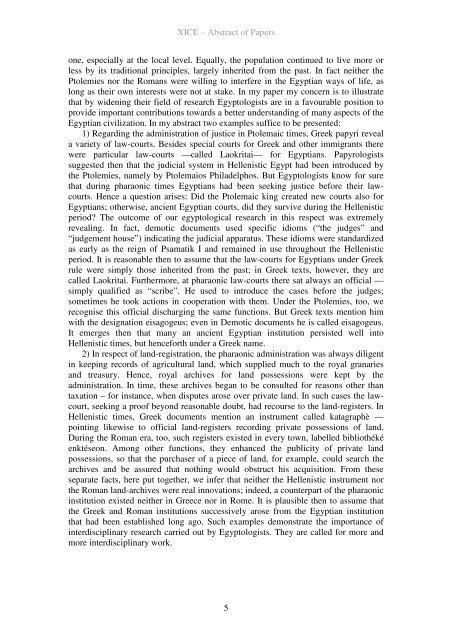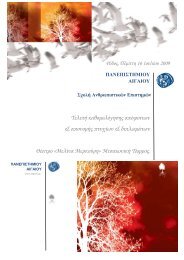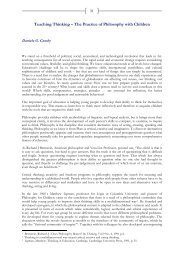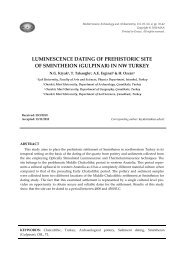Tenth International Congress of Egyptologists Abstracts of Papers
Tenth International Congress of Egyptologists Abstracts of Papers
Tenth International Congress of Egyptologists Abstracts of Papers
Create successful ePaper yourself
Turn your PDF publications into a flip-book with our unique Google optimized e-Paper software.
XICE – Abstract <strong>of</strong> <strong>Papers</strong><br />
one, especially at the local level. Equally, the population continued to live more or<br />
less by its traditional principles, largely inherited from the past. In fact neither the<br />
Ptolemies nor the Romans were willing to interfere in the Egyptian ways <strong>of</strong> life, as<br />
long as their own interests were not at stake. In my paper my concern is to illustrate<br />
that by widening their field <strong>of</strong> research <strong>Egyptologists</strong> are in a favourable position to<br />
provide important contributions towards a better understanding <strong>of</strong> many aspects <strong>of</strong> the<br />
Egyptian civilization. In my abstract two examples suffice to be presented:<br />
1) Regarding the administration <strong>of</strong> justice in Ptolemaic times, Greek papyri reveal<br />
a variety <strong>of</strong> law-courts. Besides special courts for Greek and other immigrants there<br />
were particular law-courts —called Laokritai— for Egyptians. Papyrologists<br />
suggested then that the judicial system in Hellenistic Egypt had been introduced by<br />
the Ptolemies, namely by Ptolemaios Philadelphos. But <strong>Egyptologists</strong> know for sure<br />
that during pharaonic times Egyptians had been seeking justice before their lawcourts.<br />
Hence a question arises: Did the Ptolemaic king created new courts also for<br />
Egyptians; otherwise, ancient Egyptian courts, did they survive during the Hellenistic<br />
period? The outcome <strong>of</strong> our egyptological research in this respect was extremely<br />
revealing. In fact, demotic documents used specific idioms (“the judges” and<br />
“judgement house”) indicating the judicial apparatus. These idioms were standardized<br />
as early as the reign <strong>of</strong> Psamatik I and remained in use throughout the Hellenistic<br />
period. It is reasonable then to assume that the law-courts for Egyptians under Greek<br />
rule were simply those inherited from the past; in Greek texts, however, they are<br />
called Laokritai. Furthermore, at pharaonic law-courts there sat always an <strong>of</strong>ficial —<br />
simply qualified as “scribe”. He used to introduce the cases before the judges;<br />
sometimes he took actions in cooperation with them. Under the Ptolemies, too, we<br />
recognise this <strong>of</strong>ficial discharging the same functions. But Greek texts mention him<br />
with the designation eisagogeus; even in Demotic documents he is called eisagogeus.<br />
It emerges then that many an ancient Egyptian institution persisted well into<br />
Hellenistic times, but henceforth under a Greek name.<br />
2) In respect <strong>of</strong> land-registration, the pharaonic administration was always diligent<br />
in keeping records <strong>of</strong> agricultural land, which supplied much to the royal granaries<br />
and treasury. Hence, royal archives for land possessions were kept by the<br />
administration. In time, these archives began to be consulted for reasons other than<br />
taxation – for instance, when disputes arose over private land. In such cases the lawcourt,<br />
seeking a pro<strong>of</strong> beyond reasonable doubt, had recourse to the land-registers. In<br />
Hellenistic times, Greek documents mention an instrument called katagraphè —<br />
pointing likewise to <strong>of</strong>ficial land-registers recording private possessions <strong>of</strong> land.<br />
During the Roman era, too, such registers existed in every town, labelled bibliothéké<br />
enktéseon. Among other functions, they enhanced the publicity <strong>of</strong> private land<br />
possessions, so that the purchaser <strong>of</strong> a piece <strong>of</strong> land, for example, could search the<br />
archives and be assured that nothing would obstruct his acquisition. From these<br />
separate facts, here put together, we infer that neither the Hellenistic instrument nor<br />
the Roman land-archives were real innovations; indeed, a counterpart <strong>of</strong> the pharaonic<br />
institution existed neither in Greece nor in Rome. It is plausible then to assume that<br />
the Greek and Roman institutions successively arose from the Egyptian institution<br />
that had been established long ago. Such examples demonstrate the importance <strong>of</strong><br />
interdisciplinary research carried out by <strong>Egyptologists</strong>. They are called for more and<br />
more interdisciplinary work.<br />
5






